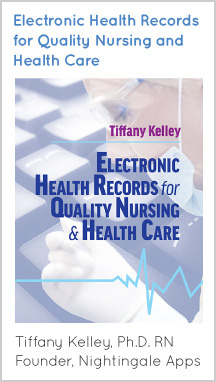“How did you know that your idea was good enough to start a business?”
I was asked this question in reference to my idea to create Know My Patient TM and then a business around it, Nightingale Apps LLC. It was a question I hadn’t been asked before. My response at that time was that I never questioned it, rather I just knew it was good enough.
For those who are not familiar, I created Know My Patient TM, Nightingale Apps’ patent-pending mobile workflow nursing solution, in an effort to address the daily challenges faced by nurses each day to access, enter and use information for the purpose of providing their patients with the best care.

In a world where we, as consumers, rely on our phones to support our own personal information needs, answer our own questions, and allow for quick entry of information to communicate with others, we must bring that to our nurses. After all, our nurses are saving lives each day. Their focal point is the patient and whatever the patient needs, where he/she needs it.
When I came up with this idea several years ago, I could not accept that nurses would continue to rely on workaround solutions with scraps of paper, be bogged down with moving heavy ‘mobile’ carts (as their mobile solution), stay late (most if not all shifts) to catch up on charting, and feel as though they have turned into ‘glorified data entry specialists’. If we continue to make it challenging for nurses to do their work, we will likely end up driving nurses away from the profession. The statistics show we cannot afford to do that and take care of the population.
There are over 3 million nurses in the United States. Nurses become nurses to provide care to patients. Nurses do not go through nursing school, to become nurses, and subsequently struggle with finding and entering information into electronic charting systems, often referred to as Electronic Health Records (EHRs). Nurses currently struggle to have the information they need about their patients at their fingertips. Yes, EHRs are the way to go in the sense that we need electronic record of information in order to apply more advanced algorithms and analytical reports on the data to improve population health outcomes. I do support the need for EHRs and even wrote a textbook for nurses and health care professionals about EHRs () to drive quality patient care.

I have worked in this field of informatics for the last 12 years and enjoy the work but I see how hard it is on nurses providing direct care and it takes a toll on their experience and overall job satisfaction. Thus we need a solution that interacts with the EHR. The solution is to provide nurses with tools that support how they work that improve their ability to be efficient. We’ve created that solution with Know My Patient TM and it has been met with remarkable praise from nurses.
So, what I didn’t say to that person who asked me the question: How did you know that your idea was good enough to start a business?” was that the problem is big enough that it deserves a solution. Additionally, the solution should be developed in such a way that addresses the needs of nurses to alleviate the challenges faced each day (look for my next blog post: 5 reasons why nurses need apps for more specific information).

 Know My Voice®
Know My Voice®





